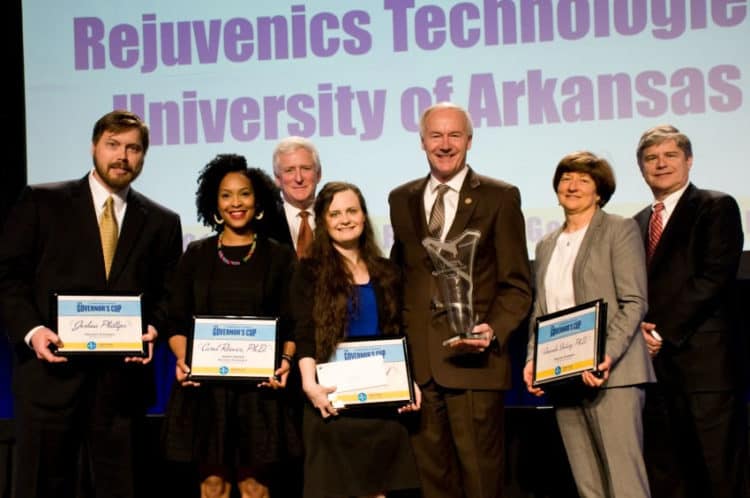
UAMS’ Amanda Stolarz, Pharm.D., Ph.D., recently celebrated her team’s victory in the Donald W. Reynolds Governor’s Cup business plan competition. The team, Rejuvenics Technologies, won the $25,000 top prize with its idea for commercializing a drug-delivery system to reduce the harmful side effects of chemotherapy.
Just under a year ago, the business side of research was hardly on her radar. Her mindset was: “I don’t want to do business at all; I want to do science.”
But Stolarz, having just received her Ph.D. last summer, soon gained new perspective.
As a postdoctoral fellow, she was encouraged to attend last summer’s Health Sciences Entrepreneurship Boot Camp by Nancy Rusch, Ph.D., who explained that discoveries don’t magically go from the laboratory to the clinic. Rusch chairs the College of Medicine Department of Pharmacology and Toxicology and leads the Translational Research Institute’s (TRI) educational efforts.
“The boot camp opened my eyes,” Stolarz said. “It showed me that if you want to see what you discover in the lab actually help people, you have to go through this process.”
So when she was invited to be part of the business-plan team that won the Governor’s Cup, she was more inclined to participate.
“Without the boot camp, it would have been a much harder sell for me to join the Rejuvenics Technologies team,” she said.
The idea of establishing entrepreneurship training for researchers, Rusch said, stems from TRI. Laura James, M.D., TRI director and vice chancellor for clinical and translational research, broached the idea and it was included as a key feature of TRI’s application for a Clinical and Translational Science Award (CTSA).
When Philip Mayeux, Ph.D., alerted Rusch about a funding opportunity that could support an entrepreneurship boot camp, Rusch was able to borrow from the work she had done for the CTSA application. Working with Nancy Gray, Ph.D., director of BioVentures, they received $50,000 in supplemental funding tied to the National Institute of General and Medical Sciences T32 Systems Pharmacology and Toxicology Training Program grant led by Mayeux.
Entrepreneurial luminaries were brought in to the boot camp, including Carol Reeves, Ph.D., associate vice provost for entrepreneurship at the University of Arkansas, Fayetteville (UAF). Reeves, who has a national reputation for developing entrepreneurs, was excited to be part of the UAMS boot camp and predicted it would lead to meaningful collaborations between the sister institutions.
Stolarz is the chief science officer for Rejuvenics Technologies, a startup at the University of Arkansas, Fayetteville. Its other officers and team members are Joshua Phillips, Tiffany Jarrett and Mary Rivard, all full-time Executive MBA students at the UAF Walton School of Business.
The startup initially worked with a product that didn’t pan out in their market validation study. What they found next turned out to be a great fit for Stolarz: technology with a potentially broad application for preventing a multitude of chemotherapy side effects.
“I got really excited because my dissertation was on finding ways to treat and prevent side effects from chemotherapy,” she said.
The technology being commercialized was developed as a joint collaboration between UAF and UAMS. The lead inventor is Daniel Fologea, Ph.D., formerly at UAF and now at Boise State University, who worked with Michael Borrelli, Ph.D., in the UAMS College of Medicine Department of Radiology.
Rejuvenics Technologies is working with St. Jude Children’s Research Hospital in Memphis and hopes to also collaborate with Houston-based M.D. Anderson Cancer Treatment Center.
Stolarz is hopeful they can develop a product that will lead to improved quality of life for cancer patients.
“This technology is designed to decrease the toxic side effects of chemotherapy while potentially increasing efficacy against tumors so we can beat cancer without beating down the patient,” she said.
